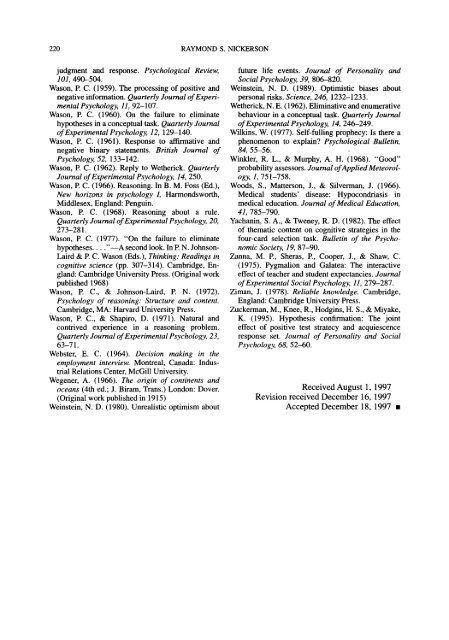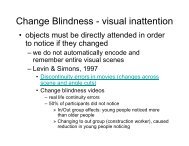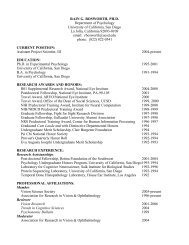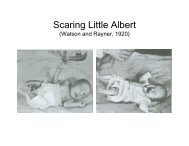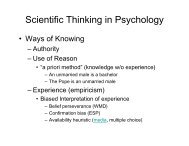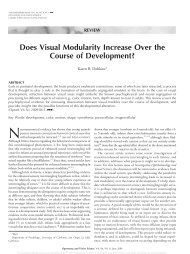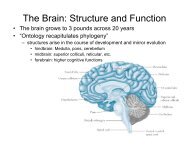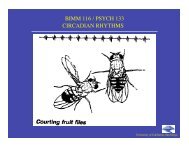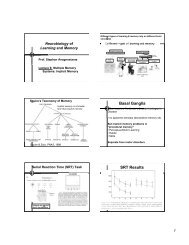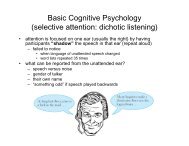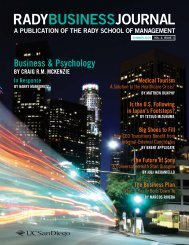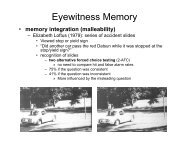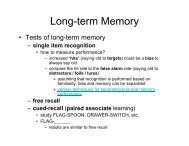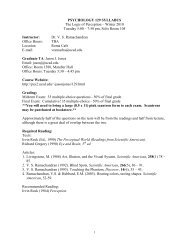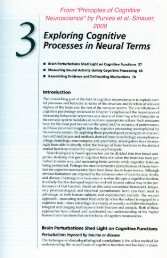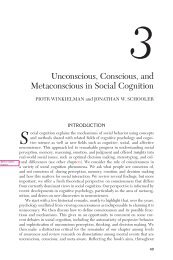Confirmation Bias: A Ubiquitous Phenomenon in Many Guises
Confirmation Bias: A Ubiquitous Phenomenon in Many Guises
Confirmation Bias: A Ubiquitous Phenomenon in Many Guises
You also want an ePaper? Increase the reach of your titles
YUMPU automatically turns print PDFs into web optimized ePapers that Google loves.
220 RAYMOND S. NICKERSON<br />
judgment and response. Psychological Review,<br />
101, 490-504.<br />
Wason, P. C. (1959). The process<strong>in</strong>g of positive and<br />
negative <strong>in</strong>formation. Quarterly Journal of Experimental<br />
Psychology, 11, 92-107.<br />
Wason, P. C. (1960). On the failure to elim<strong>in</strong>ate<br />
hypotheses <strong>in</strong> a conceptual task. Quarterly Journal<br />
of Experimental Psychology, 12, 129-140.<br />
Wason, P. C. (1961). Response to affirmative and<br />
negative b<strong>in</strong>ary statements. British Journal of<br />
Psychology, 52, 133-142.<br />
Wason, P. C. (1962). Reply to Wetherick. Quarterly<br />
Journal of Experimental Psychology, 14, 250.<br />
Wason, P. C. (1966). Reason<strong>in</strong>g. In B. M. Foss (Ed.),<br />
New horizons <strong>in</strong> psychology I, Harmondsworth,<br />
Middlesex, England: Pengu<strong>in</strong>.<br />
Wason, P. C. (1968). Reason<strong>in</strong>g about a rule.<br />
Quarterly Journal of Experimental Psychology, 20,<br />
273-281.<br />
Wason, P. C. (1977). "On the failure to elim<strong>in</strong>ate<br />
hypotheses...."—A second look. In P. N. Johnson-<br />
Laird & P. C. Wason (Eds.), Th<strong>in</strong>k<strong>in</strong>g: Read<strong>in</strong>gs <strong>in</strong><br />
cognitive science (pp. 307-314). Cambridge, England:<br />
Cambridge University Press. (Orig<strong>in</strong>al work<br />
published 1968)<br />
Wason, P. C, & Johnson-Laird, P. N. (1972).<br />
Psychology of reason<strong>in</strong>g: Structure and content.<br />
Cambridge, MA: Harvard University Press.<br />
Wason, P. C, & Shapiro, D. (1971). Natural and<br />
contrived experience <strong>in</strong> a reason<strong>in</strong>g problem.<br />
Quarterly Journal of Experimental Psychology, 23,<br />
63-71.<br />
Webster, E. C. (1964). Decision mak<strong>in</strong>g <strong>in</strong> the<br />
employment <strong>in</strong>terview. Montreal, Canada: Industrial<br />
Relations Center, McGill University.<br />
Wegener, A. (1966). The orig<strong>in</strong> of cont<strong>in</strong>ents and<br />
oceans (4th ed.; J. Biram, Trans.) London: Dover.<br />
(Orig<strong>in</strong>al work published <strong>in</strong> 1915)<br />
We<strong>in</strong>ste<strong>in</strong>, N. D. (1980). Unrealistic optimism about<br />
future life events. Journal of Personality and<br />
Social Psychology, 39, 806-820.<br />
We<strong>in</strong>ste<strong>in</strong>, N. D. (1989). Optimistic biases about<br />
personal risks. Science, 246, 1232-1233.<br />
Wetherick, N. E. (1962). Elim<strong>in</strong>ative and enumerative<br />
behaviour <strong>in</strong> a conceptual task. Quarterly Journal<br />
of Experimental Psychology, 14, 246-249.<br />
Wilk<strong>in</strong>s, W. (1977). Self-full<strong>in</strong>g prophecy: Is there a<br />
phenomenon to expla<strong>in</strong>? Psychological Bullet<strong>in</strong>,<br />
84, 55-56.<br />
W<strong>in</strong>kler, R. L., & Murphy, A. H. (1968). "Good"<br />
probability assessors. Journal of Applied Meteorology,<br />
1, 751-758.<br />
Woods, S., Matterson, J., & Silverman, J. (1966).<br />
Medical students' disease: Hypocondriasis <strong>in</strong><br />
medical education. Journal of Medical Education,<br />
41, 785-790.<br />
Yachan<strong>in</strong>, S. A., & Tweney, R. D. (1982). The effect<br />
of thematic content on cognitive strategies <strong>in</strong> the<br />
four-card selection task. Bullet<strong>in</strong> of the Psychonomic<br />
Society, 19, 87-90.<br />
Zanna, M. P., Sheras, P., Cooper, J., & Shaw, C.<br />
(1975). Pygmalion and Galatea: The <strong>in</strong>teractive<br />
effect of teacher and student expectancies. Journal<br />
of Experimental Social Psychology, 11, 279-287.<br />
Ziman, J. (1978). Reliable knowledge. Cambridge,<br />
England: Cambridge University Press.<br />
Zuckerman, M., Knee, R., Hodg<strong>in</strong>s, H. S., & Miyake,<br />
K. (1995). Hypothesis confirmation: The jo<strong>in</strong>t<br />
effect of positive test stratecy and acquiescence<br />
response set. Journal of Personality and Social<br />
Psychology, 68, 52-60.<br />
Received August 1, 1997<br />
Revision received December 16, 1997<br />
Accepted December 18, 1997


